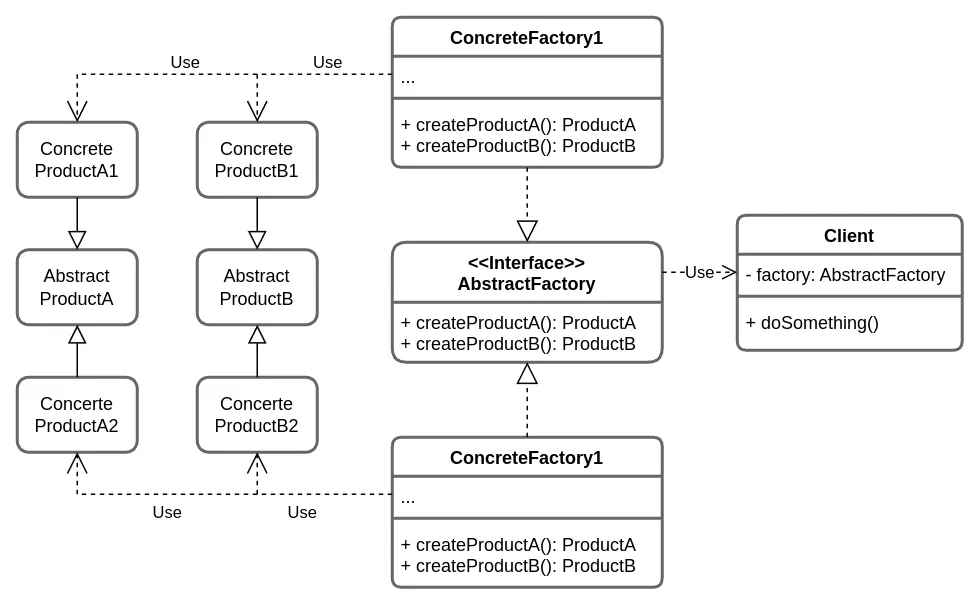Abstract Factory
Đây là 1 kiểu creational design pattern giúp ta tạo ra 1 bộ họ hàng hang hốc
các objects mà không phải định ra các class riêng biệt cho từng bộ.
Problem
Tưởng tượng ta đang tạo ra 1 app giả lập cửa hàng nội thất.
Ta cần các sản phẩm hợp lại thành 1 bộ, giả sử:
Chair+Sofa+Coffee TableTừ bộ trên ta có các collection khác nhau. Ví dụ,
Modern,Victorian,ArtDeco
Ở đây ta cần có 1 cách để tạo ra các sản phẩm đơn lẻ sao cho đúng với nhu cầu của người dùng. Người dùng họ muốn 1 Chair kiểu Modern, ta ko thể đưa cho họ cái Chair kiểu ArtDeco được... Ăn đấm ngay 😄
Bên cạnh đó, ta lại ko muốn phải thay đổi cấu trúc code của ta đi cả. 1 cái catalog có thể xuất hiện rất nhiều collections, ta ko thể mỗi lần add 1 collection mới lại phải tạo thêm 1 class mới rồi tích hợp class đó vào các tính năng đang có được, thế là quá phức tạp. Vậy phải làm như nào?
Solution
Abstract Factory sẽ được sử dụng để giải quyết vấn đề này.
Đầu tiên, ta cần quy định mỗi sản phẩm 1 cái interface để rồi có thể viết nên các biến thể của sản phẩm dựa trên interface của nó. Chẳng hạn 1 interface Chair cho các biến thể ModernChair, VictorianChair hay ArtDecoChair
interface Chair {
hasLegs(): bool
sitOn(): void
}
class VictorianChair implements Chair {
hasLegs() {}
sitOn() {}
}
...Tiếp theo ta cần khởi tạo 1 cái Abstract Factory - 1 cái interface với 1 list các methods để tạo các product
interface FurnitureFactory {
createChair(): Chair
createCoffeeTable(): CoffeeTable
createSofa(): Sofa
}Giờ để quy định các collection riêng, ta sẽ khởi tạo các factory class riêng implements cái Abstract Factory trên, mà tại đó ta sẽ tạo ra các loại sản phẩm tương ứng, chẳng hạn
class VictorianFurniture implements FurnitureFactory {
createChair() {
return new VictorianChair();
}
createCoffeeTable() {
return new VictorianCoffeeTable();
}
createSofa() {
return new VictorianSofa();
}
}Client sẽ không phải quan tâm tới các loại factory class khác nhau, thay vào đó họ chỉ cần đảm bảo input có các label để tự động gọi tới đúng loại factory.
type Label = "Modern" | "Victorian" | "ArtDeco";
type Product = "Chair" | "Sofa" | "CoffeeTable";
// API
class FactoriesCatalog {
getFactory(label: Label) {
if (label == "Modern") return new ModernFurniture();
else if (label == "Victorian") return new VictorianFurniture();
else if (label == "ArtDeco") return new ArtDecoFurniture();
}
}
// Client code
class Shop {
constructor(product: Product, label: Label) {
this.product = product;
this.factory = new FactoriesCatalog().getFactory(label);
}
someOperation() {
let prod;
if (this.product == "Chair") prod = this.factory.createChair();
else if (this.product == "Sofa") prod = this.factory.createSofa();
else if (this.product == "CoffeeTable") prod = this.factory.createCoffeeTable();
}
}Structure

Abstract Products khởi tạo interfaces cho các products
Concrete Products sẽ implement khác nhau dựa vào khuôn mẫu Abstract Products
Abstract Factory interface khởi tạo các methods để tạo nên các products riêng biệt
Concrete Factories implement các method từ Abstract Factory
Cuối cùng Client sẽ
lựa chọn
các factory bằng cách giao tiếp với interface chung Abstract Factory
Tham khảo về Abstract Factory
kỹ hơn tại Refactoring Guru.